The history of the Scientific and Technical Library: the stages of development, facts and personalities
Primary tabs
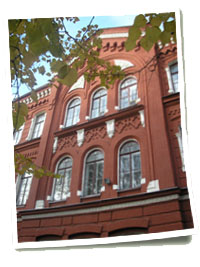 It is difficult to overestimate the importance of libraries for any educational institution. Some hotheads trying to prove that the Internet can easily replace the library and that for our contemporaries the collection of books is a rudimentary element of the information field. They also believe that there will be no place for libraries in the computerized society. But there is, however, another point of view – the library will remain as an integral part of the society structure, but it will have a different form and functions. The word «library» will not merely be associated with the «hikes behind the textbooks», but it will be associated with the words «self-development», «self-improvement», «academic degree», «scientific discoveries», «the Nobel Prize». As stated by American philosopher Alan Carter «Library is the heart of the University; there is no other (institutional) factor at the University, which would has such an impact on the quality of education of postgraduates and researchers, as the library has». The scientists who devoted a lot of time working in the library, while talking about their achievements, would have every right to quote I. Newton: «If I have seen further it is by standing on the shoulders of giants».
It is difficult to overestimate the importance of libraries for any educational institution. Some hotheads trying to prove that the Internet can easily replace the library and that for our contemporaries the collection of books is a rudimentary element of the information field. They also believe that there will be no place for libraries in the computerized society. But there is, however, another point of view – the library will remain as an integral part of the society structure, but it will have a different form and functions. The word «library» will not merely be associated with the «hikes behind the textbooks», but it will be associated with the words «self-development», «self-improvement», «academic degree», «scientific discoveries», «the Nobel Prize». As stated by American philosopher Alan Carter «Library is the heart of the University; there is no other (institutional) factor at the University, which would has such an impact on the quality of education of postgraduates and researchers, as the library has». The scientists who devoted a lot of time working in the library, while talking about their achievements, would have every right to quote I. Newton: «If I have seen further it is by standing on the shoulders of giants».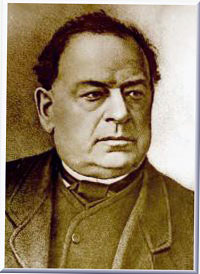 industry».
industry». In 1885 the complete sets of magazines «Crelle's Journal», «Journal für die reine und angewandte Mathematik», «Engineering», encyclopedias and chemical lexicons by Würtz, Frémy, Graham-Otto, Beilstein, Gmelin-Kraut et al. were first acquired for the library collection. They served as a starting point for evolutionary development of the library, its systematic acquisition.
In 1885 the complete sets of magazines «Crelle's Journal», «Journal für die reine und angewandte Mathematik», «Engineering», encyclopedias and chemical lexicons by Würtz, Frémy, Graham-Otto, Beilstein, Gmelin-Kraut et al. were first acquired for the library collection. They served as a starting point for evolutionary development of the library, its systematic acquisition. The last pre-revolutionary years and the 1920s were marked by radical changes in the life of society and the Institute. In 1916 on the territory of KhTI the Kharkiv Women's Polytechnic Institute founded by the South Russian Society of Technologists was opened. In KhTI mechanical and technical departments were reorganized into faculties. In 1918 the draft for the distribution of the disciplines of mechanical faculty by 10 chairs, which was implemented in the mid 20s, was adopted. There were opened electrotechnical faculty and the faculty of engineers-constructors, aviation department of mechanical faculty, the workers' faculty, preparatory courses. In 1924 there were 2400 students studied at the Institute, professorial/teaching staff has increased to 123 people. The role and importance of the library in the Institute life were at
The last pre-revolutionary years and the 1920s were marked by radical changes in the life of society and the Institute. In 1916 on the territory of KhTI the Kharkiv Women's Polytechnic Institute founded by the South Russian Society of Technologists was opened. In KhTI mechanical and technical departments were reorganized into faculties. In 1918 the draft for the distribution of the disciplines of mechanical faculty by 10 chairs, which was implemented in the mid 20s, was adopted. There were opened electrotechnical faculty and the faculty of engineers-constructors, aviation department of mechanical faculty, the workers' faculty, preparatory courses. In 1924 there were 2400 students studied at the Institute, professorial/teaching staff has increased to 123 people. The role and importance of the library in the Institute life were at 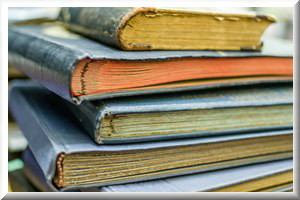 the high level. The library of KhTI was transferred under the management of the teaching department, headed by the Vice-Rector of the Institute. It faced challenges of expeditious service of borrowers and providing students and teachers of new faculties and subdivisions with necessary editions. Since 1917 the library collection has tripled, and by 1922 it reached 165,127 copies. Due to the increase of the number of borrowers the library timetable was changed: from 10 am to 10 pm (in 1922 – from 8.00 to 24.00). Taking into account new specializations and research topics the collection acquisitions policy has also changed. The implementation of the ideological and political function presented the library with new challenges.
the high level. The library of KhTI was transferred under the management of the teaching department, headed by the Vice-Rector of the Institute. It faced challenges of expeditious service of borrowers and providing students and teachers of new faculties and subdivisions with necessary editions. Since 1917 the library collection has tripled, and by 1922 it reached 165,127 copies. Due to the increase of the number of borrowers the library timetable was changed: from 10 am to 10 pm (in 1922 – from 8.00 to 24.00). Taking into account new specializations and research topics the collection acquisitions policy has also changed. The implementation of the ideological and political function presented the library with new challenges. In December 1929, the Institute was renamed the Kharkiv Polytechnic Institute. At that time there were about 30 chairs working at KhPI. The All-Union reform of the higher technical education system has been commenced, which provided for the significant increase in the number of graduation specialists. The training of engineers in-depth narrow specialization has been commenced. In 1930 there was a complete reorganization of KhPI, all its faculties had been transferred as independent branch institutes: machine-engineering (KhMMI), electrical technology (KhETI), chemical technology (KhCTI), aviation (KhAI), and others. Each branch institute has established its own libraries. The library of KhTI has provided some of its collection for the formation of libraries of the newly formed institutes. Editions on chemistry and chemical technology were handed to KhCTI, editions on electric engineering – to KhETI, editions on aeronautics and aircraft industry – to the Aviation Institute; editions on construction, architecture and descriptive geometry – to the Construction Institute; editions on automotive industry – to the Automobile and Tractor Institute. This was preceded by the painstaking work of librarians for the selection of the book collection, which was also accompanied by heavy physical activity. The Fundamental library remained at the Kharkiv Mechanical Machine Building Institute.
In December 1929, the Institute was renamed the Kharkiv Polytechnic Institute. At that time there were about 30 chairs working at KhPI. The All-Union reform of the higher technical education system has been commenced, which provided for the significant increase in the number of graduation specialists. The training of engineers in-depth narrow specialization has been commenced. In 1930 there was a complete reorganization of KhPI, all its faculties had been transferred as independent branch institutes: machine-engineering (KhMMI), electrical technology (KhETI), chemical technology (KhCTI), aviation (KhAI), and others. Each branch institute has established its own libraries. The library of KhTI has provided some of its collection for the formation of libraries of the newly formed institutes. Editions on chemistry and chemical technology were handed to KhCTI, editions on electric engineering – to KhETI, editions on aeronautics and aircraft industry – to the Aviation Institute; editions on construction, architecture and descriptive geometry – to the Construction Institute; editions on automotive industry – to the Automobile and Tractor Institute. This was preceded by the painstaking work of librarians for the selection of the book collection, which was also accompanied by heavy physical activity. The Fundamental library remained at the Kharkiv Mechanical Machine Building Institute.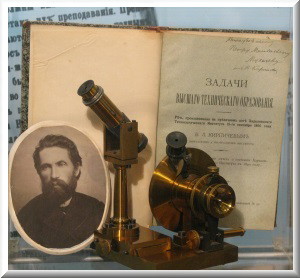 ntries.
ntries. Upon the outbreak of the Great Patriotic War the libraries and the librarians of all three institutes could not evacuate. The richest book collections of the libraries of institutes remained in Kharkiv. Soon after the capture of Kharkiv the information about the unique collection of books and magazines, kept in libraries of the first capital of Ukraine, were transferred to Berlin. In accordance with orders of the German command the export of rare scientific publications, publications on industrial technology, geology, topography and books and periodicals on strategic-military topics has been initiated. Teachers and librarians, who remained in Kharkiv, initiated work on rescue of the state property from aggressors.
Upon the outbreak of the Great Patriotic War the libraries and the librarians of all three institutes could not evacuate. The richest book collections of the libraries of institutes remained in Kharkiv. Soon after the capture of Kharkiv the information about the unique collection of books and magazines, kept in libraries of the first capital of Ukraine, were transferred to Berlin. In accordance with orders of the German command the export of rare scientific publications, publications on industrial technology, geology, topography and books and periodicals on strategic-military topics has been initiated. Teachers and librarians, who remained in Kharkiv, initiated work on rescue of the state property from aggressors.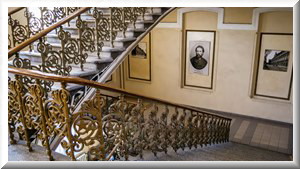
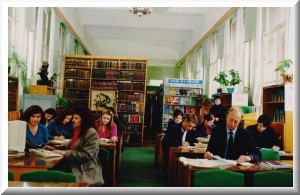 To its 75th anniversary the Kharkiv Polytechnic Institute turned into a major training and scientific center. In the context of reorganization of teaching and educational and research processes the requirements for the activity of the Institute's library have increased, its objectives and functions have become quite complex, the sphere of communications has expanded. The KhPI Library worked closely with dean's offices, departments and other divisions of the University. The number of borrowers reached 14.5 thousand people, the loan increased to 800 thousand.
To its 75th anniversary the Kharkiv Polytechnic Institute turned into a major training and scientific center. In the context of reorganization of teaching and educational and research processes the requirements for the activity of the Institute's library have increased, its objectives and functions have become quite complex, the sphere of communications has expanded. The KhPI Library worked closely with dean's offices, departments and other divisions of the University. The number of borrowers reached 14.5 thousand people, the loan increased to 800 thousand.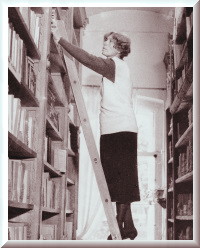 c and methodical department.
c and methodical department.The Library staff set a course for collaboration with other scientific libraries and for integration of its own generation resources into the world space. In 2006, the Library joined the project «Union catalogue of periodicals, received by the Kharkiv libraries»; in 2007, our Library joined the data bank of the Automated System of Russian Union Catalogue of Sci-Tech Literature and «The Interregional list of articles» international project. In 2008, the Library began to participate in the project «Electronic Document Delivery»; in 2010, our Library joined «The Prydniprovia Corporate Directory» project and the database of the Integrated Union Catalogue of Sci-Tech Information. In 2011, the Library joined «IRBIS Corporation» and the project «Electronic Library of Ukraine: Creation of Knowledge Centers in the Ukrainian Universities» of the ElibUkr Consortium. Within the framework of united internet resource, the Library joined the International Association of Users and Developers of Electronic Libraries and New Information Technologies (ELNIT) and the Information System of Access to the Libraries’ Electronic Catalogues in the Sphere of Education and Science (EKBSON Information System) in 2012.
The Institute of librarian-curator was organized in 2010. The Library gives a master class within the framework of the International School-Seminar «Modern pedagogical technologies in education».
In 2012, the Library initiated participation in the project «The Scientific Periodicals of Ukraine» on the platform Open Journal Systems of the network «URAN» to ensure the integration of periodicals and scientific collections of NTU «KhPI» into the world authoritative databases, electronic resources directories, scientific information retrieval systems and the world scientometric databases.
In 2013, 3 new departments were created: the Department of Rare Books and Manuscripts, the Scientific and Methodological Department, the Department of Electronic Resources. The repository based on DSpace was put into operation the same year. The distance learning course «Content Curator» was also organized. In 2014, an automated circulation in all divisions of the Library was implemented. Our Library joined the project «The Common Library Card for Kharkiv College- and Universities Libraries». The free book exchange «Bookcrossing» was also organized.
The Scientific Library daily affably opens the doors of its new modern building for comers and goers who need to use the library collection and electronic resources available to it, regardless of their place of residence, work and study.
The total area of all premises of the Library is more than 7000 square meters. The new six-storied building contains 12 book depositories. There are 6 delivery desks and 10 reading rooms at the disposal of readers.
Realizing the leading place of the Library in preparation of humanitarian and technical elite of Ukraine, Professor Leonid Leonidovych Tovazhnianskyi, Rector of NTU «KhPI», initiated the construction of the Library to create the ideal conditions for scientific inquiry and training of the Polytechnic University students. Despite all economic difficulties in our country, the University started an important affair — construction of the new Library. The implementation of such a large-scale project became possible thanks to the efforts of a large team of the Polytechnic University staff.
Following the traditions of mutual support and assistance, which had been laid by the first rector V. L. Kyrpychov and were maintained by all subsequent heads of the University, the team members and the NTU «KhPI» Alumni Association joined the financing. The NTU «KhPI» librarians, readers and city residents got a modern Library building. The project of our Library was awarded the second place at the contest for the best facilities, built and put into operation in the territory of Ukraine in 2012 in the category «The objects of education and staff training».
There is an Integrated Library Information System implemented in the building. This system coordinates the work of: data processing center; the control system to access the premises; video surveillance systems; automation of the library working process based on the radio frequency identification technology (RFID); annunciation and GPS systems. This system provides connection of more than 150 workstations, 2 servers and electronic storage. The Wi-Fi technology was implemented. The unique space planning decisions, modern design, and compliance with the logic of basic library technological processes provided our users with a comfortable stay in the Library premises.
The Library staff focuses on providing users with information and bibliographic and other services anytime, anywhere, from any device. Therefore, the role of the Library is determined not only by the size of book stock (about 1,5 million copies), but also by the quality of the offered services.
If the capacity of the databases created in 1992–2006 amounted to 32 thousand records, then now the EC has more than 700 thousand records and more than 60 thousand full-text documents. Most of these documents are stored in the institutional repository of NTU «KhPI» (http://repository.kpi.kharkov.ua). Our repository quickly attained popularity among Ukrainian scientists and the world's scientific community. According to the results of rating of the web-presence indexes among the libraries of Ukraine, our Scientific Library won the fourth place in 2015. According to the results of rating of the web-presence indexes among the libraries of higher educational institutions our Library won the first place.
The level of library automation allows users to find the fastest path to the document or information, creates the best conditions for education and provides an opportunity to make the intellectual work of readers more productive. Besides, users derive pleasure from convenient automated library services. The level of library automation gives the possibility to save such resource as His Majesty Time.
The Library annually serves more than 20 thousand users and lends out more than 1,5 million printed items. At the disposal of readers are electronic document delivery, the advance remote order, practical and scientific and practical seminars, conferences, consultations. All services, reference information and consultations are provided free of charge.
In 2012–2014, our collection of scientific publications was transferred to a new building. The staff members of 8 departments took up residence in the new office premises which were built using the latest and most innovative technology. The Integrated Information System was successfully mastered. The Library has become a platform for the meetings of writers, poets, artists, photographers. Exhibitions of painting, embroidery and works of applied art, the concerts of pupils from music schools and the concerts of creative groups are held successfully in the conference hall.
The Library staff provides the information and bibliographic support of scientific events, organize exhibitions of scientific achievements of the University lecturers and organizes virtual exhibitions of documents on the history of the University. They also give consultations for the editorial staff and the employees of the publishing houses, which issue scientific journals and collections. These consultations concern a matter of the technology of journals transition to the new platform, and also concern a matter of requirements of scientometric databases. These consultations also touch on a question of the impact factor and the citation index determination and touch upon subject of registration of ID numbers of scientists.
The Scientific and Technical Library joined the Open Access movement. The Library supports the organization of the system of scientific publications and the e-learning system on the basis of the concept of openness. Our Library is a member of four international organizations. It also continues to work effectively on generating information resources and their integration according to international and interregional corporate projects. The Library resources are integrated into many global specialized search engines of scientific information and international catalogues.
There are projects which are created and implemented directly by the Library, such as «Rectors of NTU «KhPI» (KhPTI, KhTI, KhETI, KhMMI, KhPI, KhSPU: the biobibliography)»; «The scientists of NTU «KhPI» to education, science, industry: best publications»; «Alumnus of KhTI» (materials to the series of virtual exhibitions); «The School of Electrical Engineers»: (together with the editorial staff of the «Energy saving. Power engineering. Energy audit» magazine); «Books you should read».
The Library rapidly reacts to dynamic changes in the University, looks for new approaches to the process of service of users and processing of publications, improves its activity. The Library also expands not only the range of library and information services, but also the impact on the University activities. It develops a strategy and implements a policy of development of the library model itself in accordance with the tomorrow requirements.
Since August 2021, the Library has been headed by Hlavcheva Yuliia Mykolaivna, Doctor of Philosophy. The combination of fundamental knowledge of information technologies, a scientific approach and many years of experience in librarianship made it possible in a short time to reorient the work of the Library to the needs of scientific and educational processes at the University in crisis conditions.
The library team is conscientiously working on the implementation of a new innovative model of the library of higher education:
• science and technology library as an information HUB;
• science and technology library as a client-oriented system.
On February 24, 2022, the military aggression against Ukraine began, and the martial law was imposed. Safety is the main criterion for the innovation of research and development of the scientific process.
The main approach to the work resumption of the Scientific and Technical Library was the activation of digital and information technologies use. In previous years of the COVID-19 pandemic, the library had experience in organizing remote work. In the conditions of martial law, with the impossibility of face-to-face cooperation, these technologies made it possible to resume the safety work of University employees and the safe training of applicants for education in a short period of time. Taking into account that Kharkiv became a front-line city.
The work of NTU «KhPI» was resumed from March 28, 2022, according to the order of NTU «KhPI» «On the organization of the educational process at National Technical University «Kharkiv Polytechnic Institute» dated March 10 No. 94 OD. Despite the current situation, the NTU «KhPI» Library continues to work, remains a unique unit involved in educational and scientific processes and performs a cultural and educational function.
The work on creating and supporting projects generated by STL’s employees continues. The project «The KhPI Scientific School of Chemistry» has gained active development. In January 2022, the Information and Resource Center «Without Barriers» (IRC, http://library.kpi.kharkov.ua/uk/no_barriers_home) was launched in the Scientific and Technical Library with the support of the University Administration. The center aims at creating a barrier-free academic environment, ensuring unimpeded access to reliable information resources, promoting the motivation of education applicants to study and self-realization, and psychological support.
The efforts to deliver quality service to users with special educational needs requires special theoretical and practical training, therefore the work of the virtual platform is supported - the Facebook group «With tolerance in the heart» (https://www.facebook.com/groups/358209122773207).
The cooperation between the IRC and professionals in the field of inclusion is expanding: V. Hnatyuk Inclusive Resource Center of the TNPU (Ternopil Volodymyr Hnatiuk National Pedagogical University); International Institute of Inclusion; Association of Child and Family Psychologists of Ukraine; the art-shop «Art-kramnychka Batky HUB»; the Charitable Organization «Paralelni svity»; Kharkiv Specialized School of I-III Grades, No. 114 of Kharkiv City Council, of Kharkiv Region; Communal Institution «Dergachi Lyceum №3» of the Dergachi Town Council of Kharkiv; etc. In January 2022, the preparatory work on the opening of the Publication Inclusive Support Center (PISC) began.
The purpose of the center is an orderly and systematic approach to a set of issues: promoting the publication activity of the scientific and pedagogical stuff of the university and education applicants, increasing the number of articles in leading scientific publications to ensure the presence of the University in the academic rankings of the world. In 2022, new services began to work as separate elements of the PISC:
• expert analysis of scientific editions for publishing;
• determination of publications’ quartiles;
• implementation of formal requirements for scientific publications (references);
• submitting publications to the journal's official website (Open Journal Systems (OJS) platform);
• monitoring of the information about authors and publications based on author profiles;
• technological support of NTU «KhPI» electronic publishing house
The implementation of a clear system of organizational culture prompted the Library staff to the restructuring of professional thinking and to the development of creative initiative. The development of new technologies has increased the requirements for vocational training of librarians.
Today there are 64 highly educated and erudite specialists working here. All of them have the ability to work with creative people and with huge information flows. 100% of them have higher education, 9.4% have higher education in several fields of study.
They are able to process enormous amounts of data which were obtained by scientists in the course of their research. They are also able to select reliable and high-quality information suitable for making managerial decisions in the sphere of science. The experience of the Library staff in dealing with information, regardless of its thematic focus, is a valuable foundation.
The work of the Library staff was repeatedly awarded with diplomas of the Ministry of Education and Science, with letters of appreciation from the Rectorate and with diplomas of various contests.
The Library staff sees the prospects of its development in expanding of the introduction of advanced technologies. Our librarians also see the prospects of their development in the further integration of their resources into the global information space and in collaboration with all those who work in the field of education, science, production and culture for the benefit of prosperity of Ukraine and for the sake of peace and goodness in the world.









